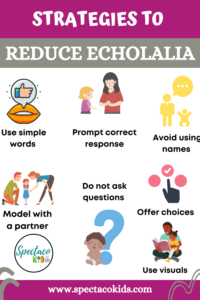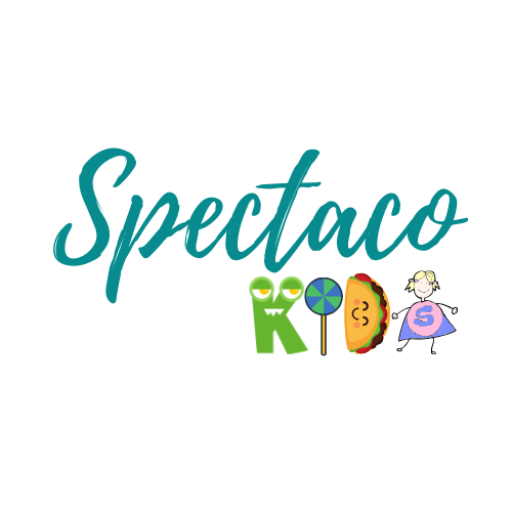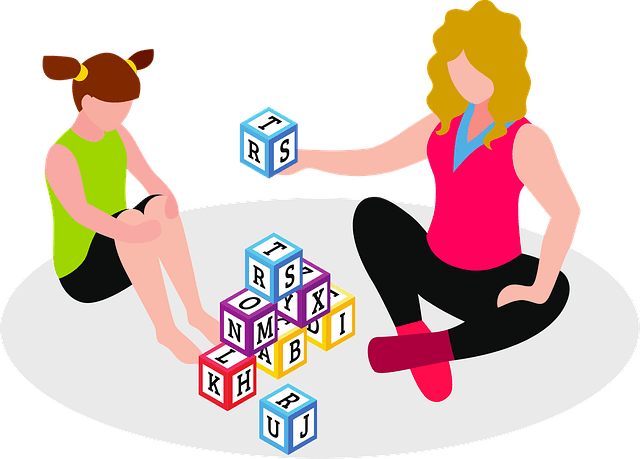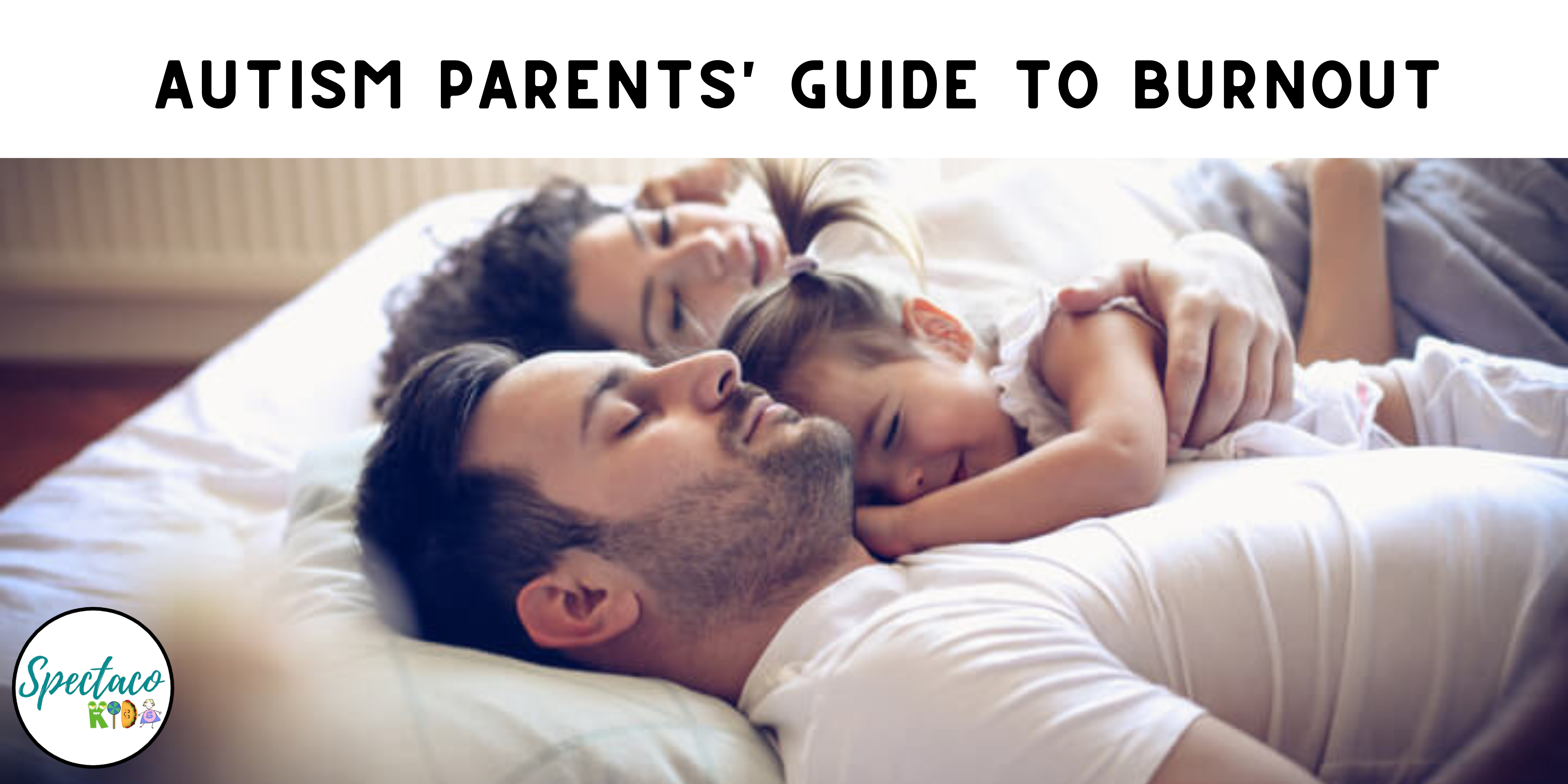What is Echolalia?
Echolalia refers to the repetition of certain words or phrases spoken by someone else, either after the words were said or later on.
Echolalia in autism
Echolalia is often associated as a function of Autism Spectrum Disorder (ASD). With an autistic child, echolalia may appear with more frequency versus children with standard developing language. While echolalia is most associated with ASD, it is not limited to it.
Individuals on the spectrum may use echolalia to cope with overwhelming sensory challenges or as a means of communication when it is too difficult for them to form their own words. They may also use it to interact and engage with others.
What are the signs of echolalia?
A person with echolalia may or may not be able to communicate normally or be able to understand others. Along with the repetition of phrases, other signs of echolalia may include frustration or annoyance during conversations, especially when asked questions.
Other signs include depression and muteness.
What is echolalia caused by?
Echolalia is a sign of developmental disability, communication disability or ASD in children over the age of three.
Adults with severe amnesia, head trauma and paralysis may also experience echolalia. In some cases, people experience echolalia only when they are distraught or worried. While others may experience it all the time, which may eventually cause them to be mute.

What are the types of echolalia?
- Immediate echolalia: Immediate echolalia refers to those words or phrases that are uttered immediately after they are heard. For example, a person may ask “Do you want an apple?” and the child would immediately respond “You want an apple”. This might be a way for the child to convey that he does want an apple. In another case, the child might repeat the question while he may be having time to process his real answer.
- Delayed echolalia: Delayed echolalia is where the individual memorizes a phrase, may it be from a movie or from an earlier conversation that he heard. In delayed echolalia, there is a distance between hearing and using the phrase. Sometimes a person may deliberately use an old phrase that he heard.
Functional and non-functional echolalia
Functional echolalia is intended to be interactional- a person is trying to communicate with another person and is using memorized phrases for a real purpose. For instance, a child may hear a line on TV such as “got cookies?” and later, when hungry, may say “got cookies?” in exactly the same tone and accent like the one they heard on TV. This is the child’s way of conveying that he really wants a cookie but is not using his own words.
Whereas, non-functional echolalia means that words being repeated do not mean anything. An individual may use non-functional echolalia for personal use or self-stimulation.
A child may be able to memorize an entire script of a cartoon episode, but he may have no idea who the characters are.
https://spectacokids.com/activities-to-help-improve-expressive-language/
Strategies to reduce echolalia:
Following are some strategies that can be used to reduce echolalia:
- Use simple words and phrases
- Prompt the correct response
- Use Visuals
- Do not ask questions
- Offer choices
- Model with a partner
- Avoid using names
- Stay patient

Use Simple Words and Phrases
When communicating with your child, try using simple words and sentences that he can comprehend. Do not repeat the sentence and wait for the child to process what you have said.
Prompt the Correct Response
Children tend to use echolalia when they do not know how to respond, or have trouble turning their thoughts into words. To help them, you can provide a script. For instance, ask your child “What is our dog’s name?” and reply “Bob.” Or you may ask your child “What is the color of the book” and reply “blue”. Repeat this until your child has learned the right script. Remember, this will only work for questions that always have the same answer.
Use Visuals
Using visual support is an important step of the strategy. Use a book that has pictures showing the language and have your child look directly at what is happening in the book. For example, while looking at the book, say, “This is an apple” and point it at the picture. You can even take his finger and point it at the apple and say “This is an apple”. Repeat until your child gives the correct response.

Do not ask questions
Avoid asking questions because when you ask questions, it gives your child the opportunity to repeat what you have said. Do not ask “Are you sleepy?” instead give the child the correct response like “I am tired, I am going to sleep”. This way your child will repeat what you have said.
Offer Choices
When talking with your child, do not ask them a question, instead give them a choice. Instead of asking them, try holding each item forward when offering the choices. For example, “Do you want _____ or _______?”. Be sure to model the names without the question tone at the end.
Model with a Partner
Another strategy to reduce echolalia is to model with a partner. Ask another person, he may be another student or a sibling your question and have them respond. For example, “Sara, what would you like to eat?” Sara will respond,” I want a banana.” Try this a few times in front of your child. Now ask your child what they want to eat.
Avoid Using Names
Avoid using your child’s name at the end of a sentence as they will start repeating it. When saying “Good Morning” say it without your child’s name. Or when you are praising your child, say “Good job!” instead of “Good job, Mike!”
Stay patient
Always be patient when your child is speaking no matter how long he takes. If your child does not feel pressured, then he will be more relaxed and will be able to use his words better. When you are done talking, allow your child to think before they form a response.
For more information, follow us on Instagram or visit our website!




I’m truly enjoying the design and layout of your site.
It’s a very easy on the eyes which makes it much more pleasant for me
to come here and visit more often. Did you hire out a designer to create your theme?
Exceptional work!
I’ve been browsing on-line more than 3 hours as of late,
but I by no means found any fascinating article like yours.
It’s beautiful price sufficient for me.
Personally, if all webmasters and bloggers made just right content material as you
probably did, the web will probably be much more useful than ever before.
Hello there, I found your site by way of Google whilst searching
for a comparable matter, your site got here up,
it seems to be great. I’ve bookmarked it in my google bookmarks.
Hello there, just become alert to your blog thru Google, and found that it is really informative.
I’m gonna be careful for brussels. I will be grateful should you proceed
this in future. Many folks will likely be benefited from your writing.
Cheers!
Heya i’m for the first time here. I found this board and I find It really useful & it helped me out much.
I hope to give something back and help others like you helped
me.
Nice post. I used to be checking continuously this weblog and I am inspired!
Extremely helpful info specially the ultimate phase :) I maintain such information much.
I was looking for this particular info for a long time. Thank you and good luck.
Fastidious replies in return of this query with real arguments and describing all about that.
Great delivery. Solid arguments. Keep uup the amazing spirit. https://menbehealth.wordpress.com/
I am genuinely glad to glance at this webpage posts which carries
tons of helpful facts, thanks for providing these kinds of information.
Also visit my blog: nordvpn coupons inspiresensation (http://t.co)
Every time I read a new post, I feel like I’ve learned something valuable or gained a new perspective. Thank you for consistently putting out such great content!
https://t.me/s/OAllaxTg
https://t.me/s/OAllaxTg
https://t.me/s/lami_lady/128
Как безопасно взять б/у технику в лизинг: проверка, риски, ограничения и юридические нюансы.
https://t.me/s/kupit_gruzoviki/78
Канал с обзорами и сравнениями грузовой техники для выбора и покупки.
Публикуем новости, технические характеристики, рыночную аналитику, советы по выбору для бизнеса.
У нас всегда актуальные цены и тренды рынка СНГ! Подпишись:
https://t.me/s/kupit_gruzoviki/1516
This website can be a stroll-by for the entire information you wished about this and didn’t know who to ask. Glimpse here, and you’ll undoubtedly uncover it.
Официальный Telegram канал Live Сasinо. Кaзинo и ставки от лучших площадок. Доступны актуальные зеркала официальных сайтов. Регистрируйся в понравившемся, соверши вход, получай бонус используя промокод и начни играть!
iGaming_live
оф. канал live-казино: рейтинги лицензионных площадок + актуальные зеркала. разбор стратегий для рулетки, баккары и монополии. специальные промокоды для новичков. зарегистрируйся и выводи деньги без лимитов.
https://t.me/s/iGaming_live/130
https://t.me/s/iGaming_best
Aw, this was an extremely good post. Finding the
time and actual effort to create a great article… but what can I say… I
hesitate a lot and never seem to get nearly anything done.
**mindvault**
mindvault is a premium cognitive support formula created for adults 45+. It’s thoughtfully designed to help maintain clear thinking
I love the efforts you have put in this, appreciate it for all the great content.
Precisely what I was searching for, thankyou for posting.
I believe you have noted some very interesting points, thanks for the post.
Capture the beauty of special moments with love Beyond Memories. Personalized crystal engravings turn love and memories into elegant, lasting works of art.
Good day! I just would like to give a huge thumbs up for the nice info you will have here on this post. I can be coming back to your blog for extra soon.
I together with my guys appeared to be reading the nice information from your web page and then instantly developed a terrible feeling I never thanked the site owner for those strategies. These guys were for this reason warmed to read through them and already have seriously been taking advantage of these things. Many thanks for getting quite accommodating and then for going for these kinds of ideal things millions of individuals are really eager to discover. My personal honest regret for not expressing appreciation to earlier.
Thị trường nhà cái uy tín đổi thưởng ngày càng bùng nổ với vô số lựa chọn, nhưng liệu đâu là nền tảng thực sự đáng tin cậy? Nhiều người chơi đã phải học bài học đắt giá khi tham gia các nhà cái thiếu minh bạch: tiền thắng không thể rút, tài khoản bị khóa vô cớ, hay tỷ lệ trả thưởng không công bằng. Hãy cùng khám phá slot365 – một lựa chọn đang được đánh giá cao bởi cộng đồng người chơi nhờ tính minh bạch, bảo mật và đa dạng trò chơi.
Thị trường nhà cái uy tín đổi thưởng ngày càng bùng nổ với vô số lựa chọn, nhưng liệu đâu là nền tảng thực sự đáng tin cậy? Nhiều người chơi đã phải học bài học đắt giá khi tham gia các nhà cái thiếu minh bạch: tiền thắng không thể rút, tài khoản bị khóa vô cớ, hay tỷ lệ trả thưởng không công bằng. Hãy cùng khám phá slot365 – một lựa chọn đang được đánh giá cao bởi cộng đồng người chơi nhờ tính minh bạch, bảo mật và đa dạng trò chơi.
Giao diện website và ứng dụng cũng chính là điểm gây ấn tượng đặc biệt với hội viên. xn88 Nền tảng cho sử dụng màu sắc hài hòa, đơn giản nhưng khi kết hợp với nhau tạo cảm giác thu hút đặc biệt. Ngoài ra, hệ thống điều hướng, danh mục đều sắp xếp vô cùng khoa học nên dù bạn có là thành viên mới thì cũng sẽ dễ dàng tìm thấy thông tin mong muốn nhanh chóng.
Giao diện website và ứng dụng cũng chính là điểm gây ấn tượng đặc biệt với hội viên. xn88 Nền tảng cho sử dụng màu sắc hài hòa, đơn giản nhưng khi kết hợp với nhau tạo cảm giác thu hút đặc biệt. Ngoài ra, hệ thống điều hướng, danh mục đều sắp xếp vô cùng khoa học nên dù bạn có là thành viên mới thì cũng sẽ dễ dàng tìm thấy thông tin mong muốn nhanh chóng.
Giao diện website và ứng dụng cũng chính là điểm gây ấn tượng đặc biệt với hội viên. xn88 Nền tảng cho sử dụng màu sắc hài hòa, đơn giản nhưng khi kết hợp với nhau tạo cảm giác thu hút đặc biệt. Ngoài ra, hệ thống điều hướng, danh mục đều sắp xếp vô cùng khoa học nên dù bạn có là thành viên mới thì cũng sẽ dễ dàng tìm thấy thông tin mong muốn nhanh chóng.
You know where to find pkwin, but have you ever seen the logo? Check out Pkwinlogo and see the brand that makes the experience so great! pkwinlogo
Hello there! I know this is kinda off topic but I was wondering if you
knew where I could locate a captcha plugin for my comment form?
I’m using the same blog platform as yours and I’m having problems
finding one? Thanks a lot! vpn https://www.highlandguides.com
Tham gia 888slot là một quá trình đơn giản, nhanh chóng và bảo mật. Với giao diện được thiết kế tối ưu cho người dùng Việt Nam, việc bắt đầu trải nghiệm nhà cái đổi thưởng trở nên dễ dàng ngay cả với những người mới làm quen với thế giới giải trí trực tuyến. TONY01-09
pagcor https://www.ngpagcor.net
2jili https://www.2jili.org
okbet15 https://www.okbet15.org